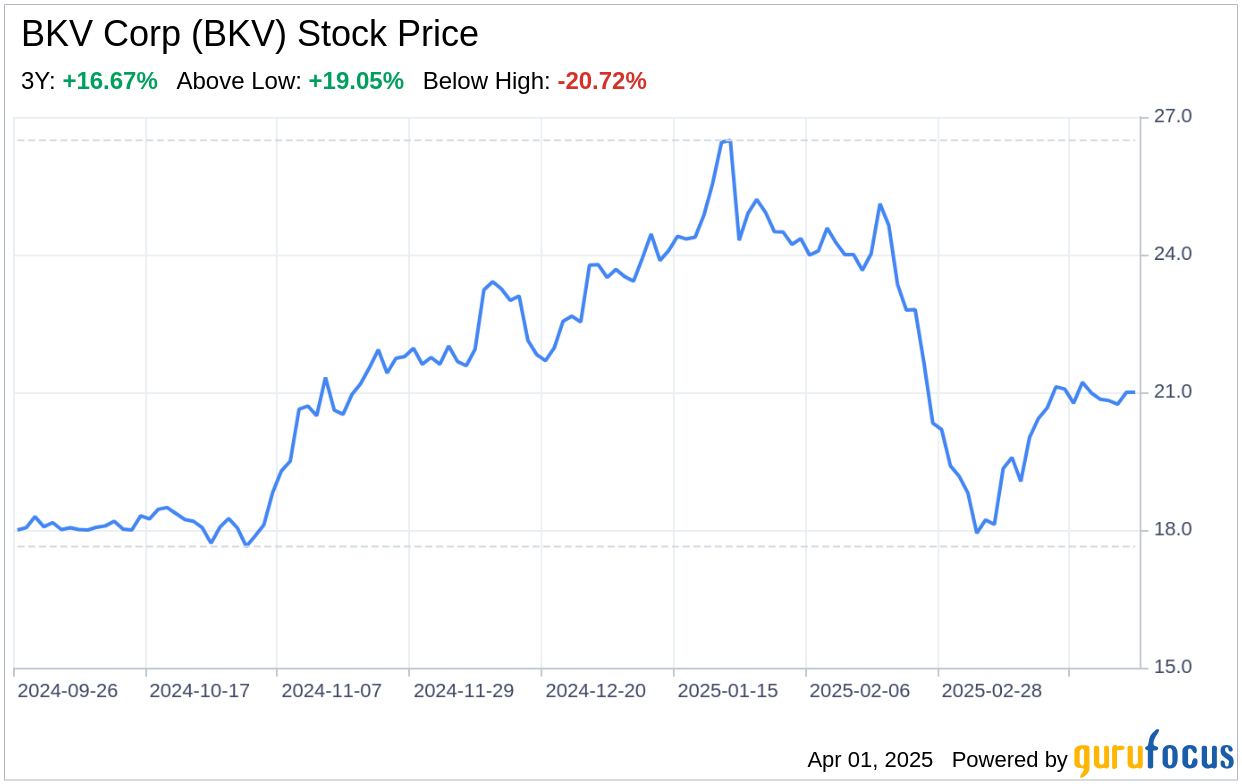BKV Corp (BKV, Financial), a growth-driven energy company, has recently filed its 10-K for the fiscal year ended December 31, 2024. This SWOT analysis delves into the company's financial health and strategic positioning. BKV Corp operates across four business lines: natural gas production, midstream services, power generation, and carbon capture, utilization, and sequestration (CCUS). With a successful IPO in September 2024, BKV Corp has shown a commitment to growth and innovation. Financially, the company reported a working capital deficit of $71.6 million as of December 31, 2024, but also generated $118.5 million in cash flows from operating activities during the same year. The company's liquidity position includes $14.9 million in cash and cash equivalents, with a strategy to fund debt payments and capital expenditures through operational cash flows.

Strengths
Integrated Business Model: BKV Corp's integrated approach, combining natural gas production with midstream services, power generation, and CCUS, creates a closed-loop system for energy production and management. This model allows for cost reductions and commercial optimization, positioning BKV as a leader in the energy sector's transition to net zero emissions.
Commitment to Sustainability: The company's goal to achieve net zero Scope 1 and Scope 2 emissions by the early 2030s, and net zero Scope 1, 2, and 3 emissions by the late 2030s, demonstrates a strong commitment to sustainability. This focus on environmental responsibility is likely to resonate with investors and consumers increasingly concerned with climate change.
Successful IPO and Growth Potential: BKV Corp's IPO in September 2024 raised significant capital, indicating investor confidence in the company's growth prospects. The IPO proceeds and subsequent operational cash flows provide the financial foundation for BKV's expansion and development plans.
Weaknesses
Material Weakness in Financial Reporting: The identification of a material weakness in internal control over financial reporting raises concerns about the accuracy and reliability of BKV Corp's financial statements. This could potentially erode investor trust and lead to increased scrutiny from regulators and stakeholders.
Reliance on Capital and Liquidity: BKV Corp's retail power business requires significant upfront capital to purchase electricity and hedges. The company's ability to secure credit and liquidity on favorable terms is crucial for its retail operations, making it vulnerable to market fluctuations and credit risks.
Operational Risks in New Business Lines: The expansion into CCUS and retail power markets introduces operational risks and uncertainties, given the company's limited experience in these areas. Successfully navigating these new ventures is critical for BKV Corp's long-term success.
Opportunities
Expansion into CCUS: BKV Corp's foray into CCUS presents an opportunity to lead in a growing market focused on reducing carbon emissions. The development of this business line could open up new revenue streams and partnerships, enhancing BKV's market position.
Growth in Retail Power Markets: The company's plans to build out its power generation business and expand into retail power provide avenues for diversification and growth. BKV's ability to supply its own natural gas directly to power plants could offer competitive advantages in terms of cost and reliability.
Technological Innovation: BKV Corp's focus on innovation, particularly in developing Carbon Sequestered Gas and other ESG-related products, positions the company to capitalize on the increasing demand for sustainable energy solutions.
Threats
Market Volatility: Fluctuations in natural gas, NGL, and oil prices can significantly impact BKV Corp's financial performance. The company's hedging strategies may not fully mitigate these risks, potentially leading to economic losses.
Regulatory Changes: BKV Corp's operations are subject to stringent regulations. Changes in law or market structure could result in unanticipated costs, particularly for the retail power business, which may not be able to pass these costs onto customers.
Operational Risks: The company's CCUS and retail power ventures face operational challenges, including the need for skilled personnel, access to capital, and maintaining regulatory permits. Any failure in these areas could adversely affect BKV Corp's business and reputation.
In conclusion, BKV Corp (BKV, Financial) exhibits a strong integrated business model and a commitment to sustainability, which are key strengths in the evolving energy sector. However, the company must address its financial reporting weaknesses and manage the risks associated with capital reliance and new business ventures. Opportunities in CCUS and retail power markets present significant growth potential, but BKV Corp must navigate market volatility, regulatory changes, and operational risks to capitalize on these prospects. Overall, BKV Corp's strategic focus on innovation and sustainability positions it well for future success, provided it can effectively manage its weaknesses and threats.
This article, generated by GuruFocus, is designed to provide general insights and is not tailored financial advice. Our commentary is rooted in historical data and analyst projections, utilizing an impartial methodology, and is not intended to serve as specific investment guidance. It does not formulate a recommendation to purchase or divest any stock and does not consider individual investment objectives or financial circumstances. Our objective is to deliver long-term, fundamental data-driven analysis. Be aware that our analysis might not incorporate the most recent, price-sensitive company announcements or qualitative information. GuruFocus holds no position in the stocks mentioned herein.
